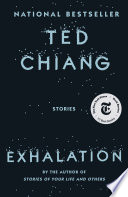Part 1
A Journey Through Imagination and What Makes Us Human in Ted Chiang's "Exhalation"
Ted Chiang's "Exhalation" isn't just a collection of stories; it's a journey into big ideas. Each story is like a tiny spaceship, carrying us to different planets of thought, exploring what it means to be alive, to think, to feel, and to understand our place in the universe. Instead of spaceships and aliens, though, Chiang uses clever ideas and thought experiments to take us on these amazing trips.
Let's dive into a few of these "spaceships":
**1. "The Merchant and the Alchemist's Gate":** Imagine a gate that lets you travel to different versions of yourself, living different lives in different timelines. This story explores the idea of choice and consequence. The merchant, a man named Robert, discovers this gate and meets different versions of himself – one who's incredibly rich, one who's tragically poor. He gets to experience the outcomes of choices he *could* have made. It's like looking into a "what if" machine, showing us that every decision we make creates a ripple effect, shaping the future in ways we may never fully understand. It makes you think: Do our choices truly define who we are? Or is there something more to us than just the sum of our decisions? This story reminds us that even small choices can have huge consequences, like throwing a pebble into a pond and watching the ripples spread.
**2. "Anxiety is the Dizziness of Freedom":** This story is all about the power of belief and how it shapes our reality. Imagine a world where people can choose their beliefs, kind of like choosing a flavor of ice cream. But what happens when you choose a belief system that clashes with reality? The story follows a woman named Natalia who chooses to believe in a comforting, but untrue, reality, and the consequences of her decision. The story is like looking at a mirror that shows us how our beliefs can blind us to truth, sometimes even creating anxiety. It explores how our choices affect not only our own lives but the lives of others. We need to carefully consider what we believe in, and how those beliefs affect the way we interact with the world.
**3. "Exhalation":** This is the title story, and it's a mind-bending exploration of consciousness and existence. Imagine a world populated by beings whose lives depend on breathing a special air, an air that slowly gets used up. As the air is used up, their understanding of the world changes. It's like watching a candle burn down – as the flame gets smaller, the light it gives off changes. This story explores the nature of existence itself. We are given a philosophical glimpse into the fundamental questions of life, death, and what it means to be conscious. Think of it as a puzzle box that leaves you pondering the nature of reality and free will. It makes you wonder what happens after we are gone, and if there’s something more to life than what we can perceive.
**4. "The Great Silence":** This story is a bit like a detective mystery in space. It involves alien civilizations and the search for extraterrestrial life. Imagine a universe filled with intelligent life, but everyone is strangely quiet, unable to communicate. This story highlights the challenges of understanding others, even if they seem similar to us. It's like trying to solve a puzzle with missing pieces, leaving us to ponder the vastness of the universe and the possibility of life beyond our planet. It questions what makes communication possible, and what happens when it fails.
These are just a few of the stories in "Exhalation," and each one is a unique adventure into the human condition. Chiang cleverly uses science fiction settings to explore deep philosophical questions. He forces us to think about things we usually take for granted – our own consciousness, the choices we make, and the nature of reality itself.
Lesson
The book "Exhalation" teaches us that even the smallest choices can have huge consequences, our beliefs shape our reality, and that the universe holds many mysteries that are worth exploring and pondering. It encourages us to question our assumptions about the world and ourselves, and to appreciate the complexity of existence.
